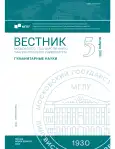Linguistic Interference as a Sociocognitive Phenomenon
- Authors: Mozol T.S.1
-
Affiliations:
- Moscow State Linguistic University
- Issue: No 5(886) (2024)
- Pages: 78-85
- Section: Linguistics
- URL: https://journal-vniispk.ru/2542-2197/article/view/303551
- ID: 303551
Cite item
Abstract
The problem of linguistic interference combines both cognitive and social aspects, therefore it seems important to study this phenomenon within the framework of sociocognitive linguistics. The linguistic interference (contact-induced linguistic changes) is realized both at the collective level (language policy, cultural models) and at the individual level (violation of existing linguistic norms for the sake of achieving the highest communicative norm). Both levels are closely interconnected and interdependent.
About the authors
Tatiana Sergeevna Mozol
Moscow State Linguistic University
Author for correspondence.
Email: yoondanhee@gmail.com
PhD (Pedagogy), Associate Professor, Head of the Oriental Languages Department, Faculty of Translation and Interpreting
Russian FederationReferences
- Zenner, E., Backus, A., Winter-Froemel, E. (Eds.). (2019). Cognitive Contact Linguistics. Placing Usage, Meaning and Mind at the Core of Contact-Induced Variation and Change. Berlin/Boston: Mouton De Gruyter, 2019. (Cognitive Linguistic Research, ed. by D. Geeraerts, D. Divjak, J. R. Taylor, vol. 62).
- Harder, P. (2010). Meaning in mind and society: A functional contribution to the social turn in cognitive linguistics. Berlin: Mouton de Gruyter.
- Dąbrowska, E. (2020). Language as a phenomenon of the third kind // Cognitive Linguistics, 31(2), 213–229.
- Iriskhanova, O.K. (2014). Sociocognitive linguistics and the study of social knowledge structures // Issues of Cognitive Linguistics, 4(041), 5–17. (In Russ.)
- Pütz, M., Robinson, J., Reif, M. (2014). The Emergence of Cognitive Sociolinguistics. In M. Pütz, J. Robinson, M. Reif (eds.), Cognitive Sociolinguistics. Social and cultural variation in cognition and language use (pp. 1–22). Amsterdam.Phildelphia: John Benjamins Publishing Company.
- Croft, W. (1990). Typology and universals. Cambridge: Cambridge University Press.
- Keller, R. (1994). On language change: the invisible hand in language. London: Routledge.
- Croft, W. (2010). Explaining language change: an evolutionary approach. London: Longman.
- Geeraerts, D. (2010). Theories of lexical semantics. NY: Oxford University Press.
- Bartsch, R. (1982). The Concepts “Rule” and “Norm” in Linguistics. Lingua, 58, 51–81.
- Geeraerts, D. (2018). Ten Lectures on Cognitive Sociolinguistics. Leiden/Boston: Brill.
- Mozol, T.S. (2022). Jazykovaja politika Respubliki Koreja v 21 veke = Language Policy of the Republic of Korea in the 21st century. In Tangalycheva, R. K. (ed.), Modernization of Korea: Politics, Economy, Society, Culture (pp. 234-258). Мoscow: VCIOM. (In Russ.)
- Enfield, N. J. (2014). Natural causes of language: Frames, biases and cultural transmission. Berlin: Language Science Press. (Conceptual Foundations of Language Science 1).
Supplementary files










